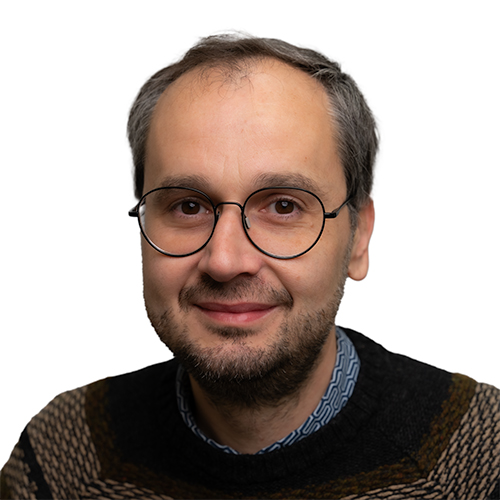Biography
Paschalis Gkoupidenis has a BSc in physics from the University of Ioannina (2005), an MSc in microelectronics from the University of Athens (2007) and a Ph.D. in materials science from National Centre of Scientific Research, “Demokritos,” in Athens, Greece (2014). During his Ph.D., Gkoupidenis worked on understanding the ionic transport mechanisms of organic electrolytes. In 2015, he started as a postdoctoral scholar at the Department of Bioelectronics (EMSE, France), where he worked on the design and development of organic neuromorphic devices based on mixed ionic-electronic conductors. In 2017, he joined the Max Planck Institute for Polymer Research (Germany), as a group leader (equivalent to assistant professor) at the Department of Molecular Electronics. The research in his group focused on the fields of organic neuromorphic electronics and bioelectronics (link to Max Planck group page). Gkoupidenis is one of the founders of the field of organic neuromorphic electronics. His research has been featured frequently in the international media (Scientific American, Yale Scientific, Max Planck Society Newsroom, TechXplore, Advanced Science News) and he frequently delivers invited talks at key conferences (Materials Research Society, International Society for Optics and Photonics).
In 2024, Gkoupidenis joined the faculty of North Carolina State University as an Associate Professor with a joint appointment in the Departments of Electrical and Computer Engineering and Physics. His research focuses on emulating and interfacing biological systems with organic neuromorphic electronics. This work aims to: (i) understand biological signal processing through reverse engineering; (ii) integrate intelligence into unconventional applications such as sensors, actuators, soft robotics, and biocomputing; and (iii) implement energy-efficient, multimodal, and natural-like communication in bioelectronic interfaces.
Selected Publications
- D. Panigrahi, D. Zucchelli, Z. Hamid, C. Kousseff, A. Sarkar, A. Pavlou, Z. Ling, S. Kashani, I. McCulloch, P. W. M. Blom, F. Torricelli, P. Gkoupidenis, “Ion‐Reconfigurable N‐Shaped Antiambipolar Behavior in Organic Electrochemical Transistors”, Adv. Mater. e16684 (2025). Link
- P. Belleri, J. Pons i Tarrés, I. McCulloch, P. W. M. Blom, Z. M. Kovács-Vajna, P. Gkoupidenis, F. Torricelli, “Unravelling the operation of organic artificial neurons for neuromorphic bioelectronics”, Nat. Commun. 15, 5350 (2024). Link
- I. Krauhausen, S. Griggs, I. McCulloch, J. M. J. den Toonder, P Gkoupidenis, Y. van de Burgt, “Bio-inspired multimodal learning with organic neuromorphic electronics for behavioral conditioning in robotics”, Nat. Commun. 15, 4765 (2024). Link
- P. Gkoupidenis, Y. Zhang, H. Kleemann, H. Ling, F. Santoro, S. Fabiano, A. Salleo, Y. van de Burgt, “Organic mixed conductors for bioinspired electronics”, Nat. Rev. Mater. 9 (2), 134 (2024). Link
- T. Sarkar, K. Lieberth, A. Pavlou, T. Frank, V. Mailaender, I. McCulloch, P. W. M. Blom, F. Torriccelli, P. Gkoupidenis, “An organic artificial spiking neuron for in situ neuromorphic sensing and biointerfacing”, Nat. Electron. 5, 774 (2022). Link
- I. Krauhausen, D. Koutsouras, A. Mellianas, S. T. Keene, H. Ledanseur, K. Lieberth, A. Giovannitti, F. Torricelli, I. McCulloch, P. W. M. Blom, A. Salleo, Y. van de Burgt, P. Gkoupidenis, “Organic neuromorphic electronics for sensorimotor integration and learning in robotics”, Sci. Adv. 7, 50 (2021). Link
- P. Gkoupidenis, D. Koutsouras, G. G. Malliaras, “Neuromorphic device architectures with global connectivity through electrolyte gating”, Nat. Comm. 8, 15448 (2017). Link
- P. Gkoupidenis, N. Schaefer, B. Garlan, G. G. Malliaras, “Neuromorphic functions in PEDOT:PSS organic electrochemical transistors”, Adv. Mater. 27, 7176 (2015). Link
Education
-
Bachelor's
2005
Physics
University of Ioannina, Greece -
Master's
2007
Microelectronics
University of Athens, Greece -
Ph.D.
2014
Materials Science and Engineering
University of Ioannina, Greece
Involvement
-
Chancellor's Faculty Excellence Program
Main Faculty -
ORaCEL - Organic and Carbon Electronics Cluster (NC State)
Main Faculty -
NC State Neuroscience
Associated Faculty -
Max Planck Institute for Polymer Research, Mainz (Germany)
Visiting Faculty

